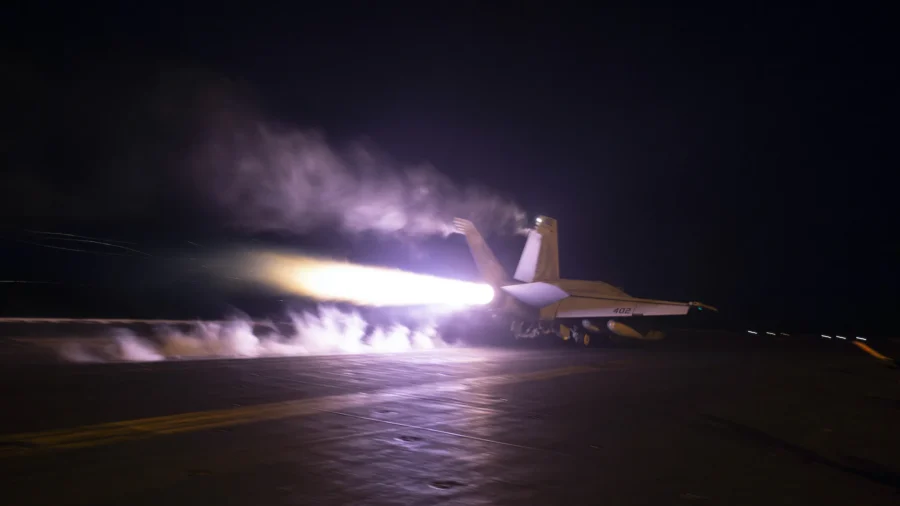U.S. forces carried out a strike against an Iran-backed Houthi anti-ship missile in Yemen that was prepared to launch early Saturday after the group hit an oil tanker.
On Friday, U.S. Central Command (CENTCOM) said that a ballistic missile launched from Houthi-controlled areas in Yemen hit and damaged an oil tanker in the Gulf of Aden, with no reports of injuries.
At around 3:45 a.m. local time on Jan. 27, U.S. forces identified a Houthi missile that CENTCOM said was “prepared to launch” and presented an imminent threat to merchant vessels and U.S. Navy ships in the region.
“U.S. Forces subsequently struck and destroyed the missile in self-defense,” CENTCOM said in a statement.
Series of Strikes
The Houthi missile strike on Friday took place at around 7:45 p.m. local time and struck the Marshall Islands-flagged oil tanker M/V Marlin Luanda. The ship, which sustained unspecified damage, issued a distress call, prompting the USS Carney and other coalition ships to respond and render assistance.
The Houthi strike was the latest in a series of attacks against vessels navigating through one of the busiest shipping corridors in the world.
Earlier on Friday, the USS Carney was targeted by Houthi forces, which CENTCOM said fired one anti-ship ballistic missile towards the destroyer, which successfully shot down the missile, with no injuries or damage reported.
The targeting of the U.S. Navy ship came a day after Houthi forces fired three missiles at a U.S.-flagged, owned, and operated container ship that was leaving the Gulf of Aden. One of the missiles missed and fell into the sea, while the other two were shot down by the USS Gravely.
The Iran-aligned Houthi movement, which the United States designates as a terrorist organization, began attacking vessels in the region about two months ago in what it says is action in support of Palestinians in Gaza amid Israel’s military operation there.
Israel has been battling in Gaza to eliminate Hamas, which, like the Houthis, is a U.S.-designated terror group, after the brutal Oct. 7 Hamas attacks against Israeli border communities.
Impact on Shipping
Amid the Houthi missile strikes against shipping vessels in regional waterways, freight going through the Suez Canal has dropped by a stunning 45 percent over the past two months, according to UNCTAD, the United Nations Conference on Trade and Development.
Shipping companies have diverted ships from the Red Sea in response to the Houthi missile threat.
Jan Hoffmann, UNCTAD’s head of trade logistics, said Thursday that the Houthi activity has meant that three key global trade routes are now in a state of disruption.
Russia’s invasion of Ukraine has disrupted the flow of goods like grain and oils in the Black Sea, while low water levels from drought have impacted the Panama Canal, where shipping in December was down 36 percent year-over-year.
“We are very concerned,” Mr. Hoffmann told reporters at a briefing on Thursday while warning that the disruption to shipping means more inflationary pressures.
While spot container rates recently recorded their sharpest weekly rise of around $500, rates remain about half of the peak hit during the COVID-19 pandemic.
Mr. Hoffmann said that it normally takes about a year for higher freight rates to get passed along to consumers.
The Houthis, also known as Ansar Allah, are a Shiite movement that has been engaged in conflict with Yemen’s internationally recognized government since 2004.
Recently, the Houthis have turned their attention to the ongoing Israel–Hamas conflict, launching missile and drone attacks against merchant ships they believe are connected to Israel, with the aim of impeding Israeli operations in Gaza.
The U.S. government has long suspected the Iranian regime of supplying and funding the Houthis.
While Iran has cheered the recent Houthi attacks, it has denied arming the group or helping it plan attacks.
Reuters and Ryan Morgan contributed to this report.
From The Epoch Times


